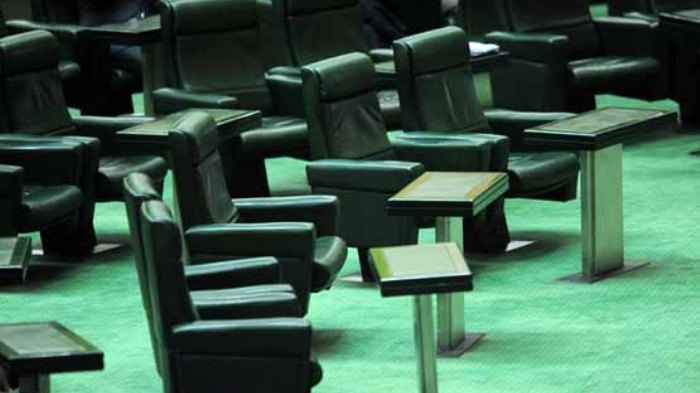Error 404: Reformist Not Found

The reformists’ dream to make a powerful comeback to the political scene went up in smoke as, on Saturday, the same day as Implementation Day , the Guardian Council, whose decisions since the mid-1990s have hurt the Reformist front, carried out its strictest dismissal of Reformist candidates so far. According to Hossein Marashi, senior member of the Kargozaran party and a relative of Akbar Hashemi Rafsanjani, of the 3000 Reformist figures who registered for the elections, only 30 individuals have been qualified, which shows a staggering figure of 1%. The exclusionary attitude of the Guardian Council towards the Reformists has become progressively stronger since the 7th parliamentary elections of 2003, but this year’s dismissals were unexpected and shocked Reformists who believed they could embark upon the platform of nuclear agreement and détente with the West to make inroads into Baharestan, the parliament.
Hardliners have tried to play down the Reformists’ purge, stressing their role in the 2009 Sedition, the so-called ‘fetneh’, and rationalize their ban from the competition. Kayhan Daily has reported of a “secret meeting” by “elements of Sedition” to discuss ways of instigating controversy over the dismissals and “cover up economic inefficiency” of the government. However, it seems that the Guardian Council has been indiscriminate in its disqualification of Reformists, even barring figures such as Mohsen Mehr-Alizadeh who has hardly uttered a word in defense of the 2009 protests, let alone the Reform movement in general. The dismissals have raised ire even among some Principlist figures such as Ayatollah Dorri Najafabadi, a member of the Combatant Clergy Association (which despite its title includes conservative right-wing clerics). Dorri indirectly requested the Guardian Council “to act wisely”. Participation of a larger number of candidates “will ease international pressure and take away excuses from the enemy”, he said.
With no hopes for the Guardian Council to change its decision, the Reformists, along with several pro-Rouhani nominees and aspirants from the Principlist camp, will probably resort to traditional lobbying and middlemanship. Hojjatoleslam Ashrafi Esfahani, a senior official in the presidential office, reported of Rouhani’s negotiations with the Supreme Leader, although he later denied remarks. Tehran’s Governor Hossein Hashemi also called for negotiations between the Ministry of Interior, which is in charge of holding the elections, and the Guardian Council. “The Supreme Leader has stated that even those who do not believe in him or the establishment should vote, but there must be someone to vote for.” The Reformist newspaper Etemad also speculated that President Rouhani and parliamentary speaker Ali Larijani will step in to negotiate with the Guardian Council to loosen the filter and let more nominees run for the parliamentary seats. According to Etemad’s report, even Larijani is seeing some of his close allies in the parliament being barred from running.
However, it is a matter of doubt if negotiations will lead to participation of a larger number of candidates. Amir Mohebbian, a Principlist analyst, believes that negotiations will only lead to qualification in isolated cases, and not a massive approval of the dismissed candidates. Abbas Abdi, the unflappable Reformist analyst, holds such a belief. “This is a political issue and not a legal case” Abdi says. He adds that even a special decree by the Supreme Leader Ayatollah Khamenei cannot solve the issue once and for all. Addressing the lengthy struggle between the Reformists and Principlists, Abdi says: “both sides need to reach a sustained agreement”.

